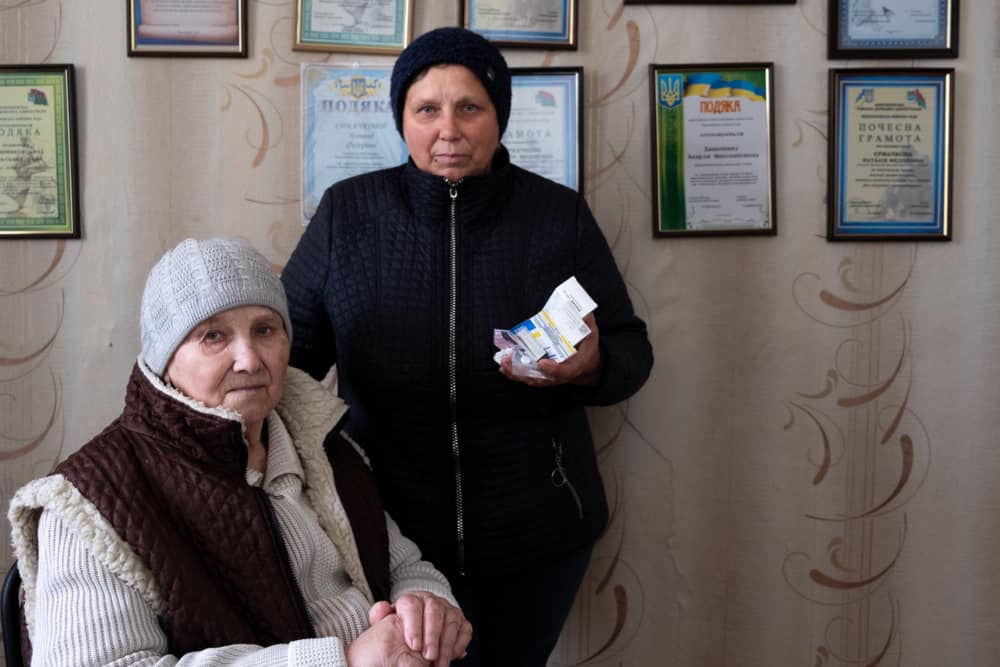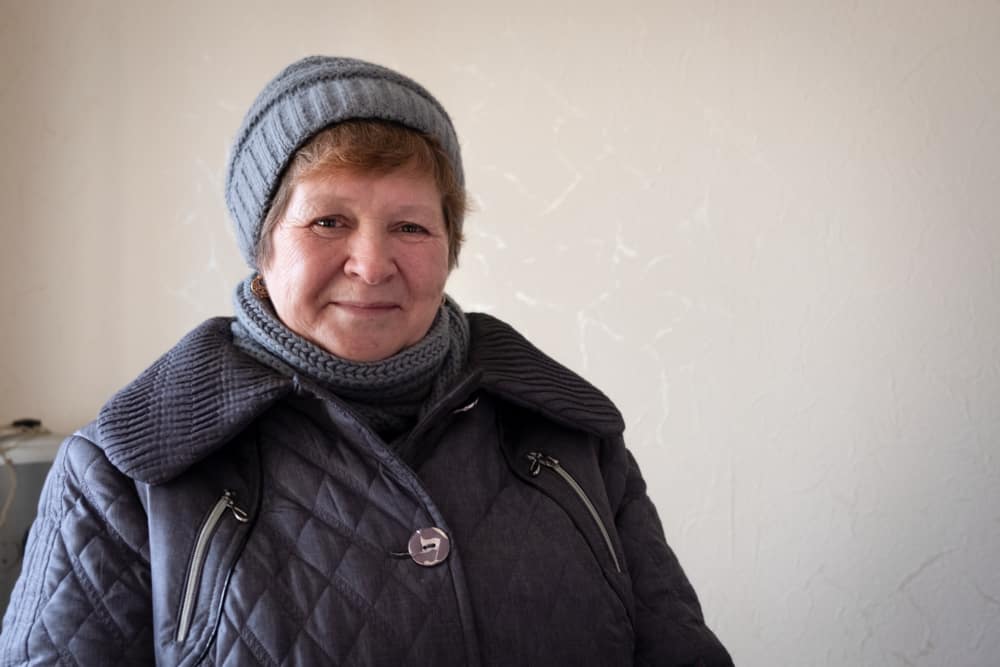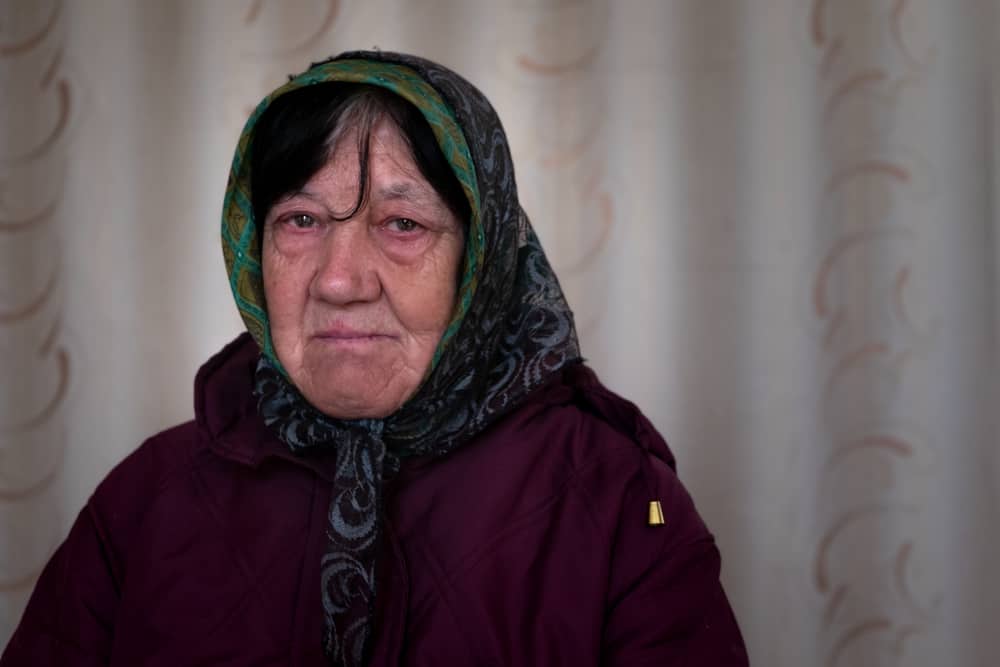As the Russian army took control of towns and villages across Ukraine’s Kharkiv region in late February 2022, those unable or unwilling to leave their homes were mostly the elderly and people with disabilities. Caught up in the middle of the fighting, they coped by turning cellars into shelters and sharing scraps of food with neighbours, while enduring the near-continuous bombings.
Now, three months after the Ukrainian army retook control of these areas, people’s medical and mental health needs are still high. Many communities have been left with damaged health facilities, while many residents have been left with psychological wounds caused by months of fear, loss, isolation and proximity to violence. MSF mobile clinic teams are working in the area to provide people with general medical care and mental health support.
Uncontrolled chronic diseases
Most patients at MSF’s mobile clinic are babushkas – older women and grandmothers – many living with disabilities such as limited mobility and loss of hearing or sight. Some of these medical conditions are the result of age, others of untreated chronic illnesses, such as hypertension and diabetes.
“We are seeing very high levels of blood pressure, such as 200 over 100, compared to a regular blood pressure reading of 120 over 80,” says MSF medical team leader Dr Gino Manciati. “In another context, these patients would be hospitalised. Here it’s just not possible.”
Untreated hypertension can lead to serious complications, including sight loss, kidney failure, neurological impairment and even sudden death. The lack of doctors, nurses and medicines, on top of all the stresses of living through war, have seen many patients’ medical conditions spiral out of control.
“Sadly, we have seen patients with end of organ complications, such as kidney failure,” says Dr Manciati.
In this region, the war has prevented many people with diabetes from getting hold of medications, while food shortages have prevented them from controlling their diet, leading to problems with mobility, eyesight, and muscle function, and increasing their dependence on others.
One of these is Maria, who has difficulty walking after her diabetes went untreated for months.
“We came here [to the clinic] because of the babushka,” says Maria’s daughter Tonya. “She is shaking and has a headache. We’ve had no medication for her diabetes [for months].”
Tonya’s husband, who suffers from paralysis, is back at their home. Like many others with severe disabilities, Tonya’s husband finds it difficult to leave the house and so cannot access any healthcare at all.

“One elderly woman had walked for 30 minutes to reach our clinic, which isn’t easy when you have trouble walking,” says Dr Manciati. “What surprised me was that she wasn’t there for herself, but to get medication for her husband. We see this sometimes: these elderly women come to us from far away, not only for themselves, but for their husbands or daughters or sons, who can’t get to us. You think you are here to support the people you see, but sometimes the impact goes beyond that.”
Support to heal psychological wounds
“When the war arrived on the morning of 24 February, I was sitting close to my window,” says 68-year-old Raisa, who stayed in her home village of Yakovenkove since February. “I heard loud explosions and saw a cloud of dust in the sky. Rows of tanks began to move forward. When we understood that it would not all be over in one day, we tried to figure out what to do next: how to eat, how to tend our gardens. We tried to get used to the situation, but it was impossible to get used to this amount of shelling. Shooting all night and all day. It was terrible.”
Raisa is receiving mental health support from the psychologists in MSF’s mobile clinic team. They provide patients with tools to control their stress, which can help to normalise blood pressure, and with coping mechanisms for anxiety, acute stress reactions and panic attacks.

“I came to see the psychologist because I still can’t sleep,” says Raisa. “In the darkness of night, rockets are flying over the buildings. It’s very scary. It’s destroying my nervous system.”
Although most people will recover on their own from the nightmares and flashbacks, mental health support can speed up their recovery. When mental health support alone is not enough, the MSF doctors and psychologists work together to find the best way to support patients.
“I am sleeping very badly, I am exhausted,” says 70-year-old Valentyna, from Vasylenkova, whose son Roma was killed by a landmine. “I wake up horrified and see him in front of me.”
Valentyna is receiving general healthcare to help with her sleeping problems, while MSF psychologists are providing her with mental health support.
“This war took my health and my son,” she says. “I am crying and screaming. Now he is gone and my life is over.”

Many of the older women who come to MSF’s clinics feel isolated, abandoned and lonely. Grieving the loss of family members and the loss of the life they knew, many report feeling their lives no longer have purpose.
“For these older women, the feeling of having lost their purpose in life causes anxiety, and the feeling of having to rebuild a new purpose for the last years of their lives causes hopelessness,” says MSF mental health activity manager Camilo Garcia. “We hear elderly women tell us that they feel like the last years of their lives have been stolen from them.”
Among the most vulnerable are older people with dementia or psychiatric conditions who were unable to travel to safety at the start of the war and those alone with no one to care for them. Some deciding to stay in their homes, others evacuated to overcrowded hospices in the cities; these evacuations are still continuing.
Although the mental health needs of people in this region are high, Garcia believes that their inner strength will help them cope and recover.
“The babushkas of Ukraine have a hidden power: resilience,” he says. “They decided to stay in their villages despite the fighting and despite the bombs. They have defended their right to stay where they belong, which takes courage.”
-
Related:
- MSF in Ukraine
- Ukraine
- War in Ukraine












